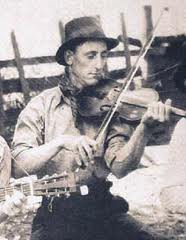Annotation:Lost Train Blues: Difference between revisions
No edit summary |
No edit summary |
||
| (One intermediate revision by the same user not shown) | |||
| Line 2: | Line 2: | ||
{{TuneAnnotation | {{TuneAnnotation | ||
|f_tune_annotation_title=https://tunearch.org/wiki/Annotation:Lost_Train_Blues > | |f_tune_annotation_title=https://tunearch.org/wiki/Annotation:Lost_Train_Blues > | ||
|f_annotation='''LOST TRAIN BLUES.''' AKA and see "[[Puncheon Floor (2)]]," "[[White Mule]]." American, Reel (2/4 and cut time). USA, Tenn. G Major. Standard tuning (fiddle). AABB (Brody): ABBCCCBB (Phillips). Some accounts credit this somewhat improvisational composition (e.g. the train sounds) to Arthur Smith (Tenn), however, Charles Wolfe thinks Smith may have learned it from the Crook Brothers (Tenn.) who often featured it on the Opry. While Smith's version was undeniably influential, the piece was recorded earlier by Da Costa Woltz's Southern Broadcasters, and by Henry Whitter; both recordings featured the tune played on harmonica. See also note for "[[Puncheon Floor (2)]]." | |f_annotation='''LOST TRAIN BLUES.''' AKA and see "[[Puncheon Floor (2)]]," "[[White Mule]]." American, Reel (2/4 and cut time). USA, Tenn. G Major. Standard tuning (fiddle). AABB (Brody): ABBCCCBB (Phillips). Some accounts credit this somewhat improvisational composition (e.g. the train sounds) to Arthur Smith (Tenn), however, Charles Wolfe thinks Smith may have learned it from the Crook Brothers (Tenn.) who often featured it on the Opry. Smith and the Crook Brothers were both performers at the early Grand Ole Opry, and the tune was a favorite with the latter. While Smith's version was undeniably influential, the piece was recorded earlier by Da Costa Woltz's Southern Broadcasters, and by Henry Whitter; both recordings featured the tune played on harmonica. See also note for "[[Puncheon Floor (2)]]." | ||
[[File:arthursmith.jpg|250px|thumb|left|Fiddlin' Arthur Smith]] | [[File:arthursmith.jpg|250px|thumb|left|Fiddlin' Arthur Smith]] | ||
<br> | |||
<br> | |||
Major Franklin's "[[Whoa Mule (2)]]" is a similar tune. | |||
|f_source_for_notated_version=Lyman Enloe [Phillips]; Arthur Smith [Hartford/Devil's Box]. | |f_source_for_notated_version=Lyman Enloe [Phillips]; Arthur Smith [Hartford/Devil's Box]. | ||
|f_printed_sources=Brody ('''Fiddler's Fakebook'''), 1983; p. 179. Stephen F. Davis ('''Devil's Box'''), vol. 24, No. 4, Winter 1990; p. 20. Phillips ('''Traditional Music in America, vol. 2'''), 1995; p. 82. | |f_printed_sources=Brody ('''Fiddler's Fakebook'''), 1983; p. 179. Stephen F. Davis ('''Devil's Box'''), vol. 24, No. 4, Winter 1990; p. 20. Phillips ('''Traditional Music in America, vol. 2'''), 1995; p. 82. | ||
Latest revision as of 19:46, 19 June 2023
X:1 T:Lost Train Blues C:Arthur Smith M:2/4 L:1/8 R:Reel N:Transcribed by John Hartford from the playing of Arthur Smith B:Stephen F. Davis - "Devil's Box", vol. 24, No. 4, Winter 1990, p. 20. Z:AK/Fiddler's Companion K:G P:A e>g f^d-|^d/e/c/B/ G/B/c/^d/|ef/a/ f-^e- e/d/c/c/ B/G/[GB]| g>a g-b-|b/g/a/g/ e/g/g-|g/a/b/a/ g/f/g/a/|g/d/c/B/ A/G/[GB]|| P:B +slide+B>A G>A|B/G/A/G/ E/GA/|+slide+B.A Gg|=f/e/d/c/ B/G/[GB]:| P:C ||+slide+[B4d4]|[_B/^c/][=B/d/][_Bc][B2c2]|+slide+[Bd]>[Bd] [_B_d][Ac]|[G3B3]|| P:D "Richochet:" D/F/||G/B/A/G/ G/B/A/G/|G/B/A/G/ G/B/A/G/|G/B/A/G/ G/B/e/f/|g/e/d/c/ B/G/:| P:E +slide=B>A G>A| B/A/A/G/ E/GA/|B>A Gg-|=f/e/d/c/ c/A/[GB]:|
LOST TRAIN BLUES. AKA and see "Puncheon Floor (2)," "White Mule." American, Reel (2/4 and cut time). USA, Tenn. G Major. Standard tuning (fiddle). AABB (Brody): ABBCCCBB (Phillips). Some accounts credit this somewhat improvisational composition (e.g. the train sounds) to Arthur Smith (Tenn), however, Charles Wolfe thinks Smith may have learned it from the Crook Brothers (Tenn.) who often featured it on the Opry. Smith and the Crook Brothers were both performers at the early Grand Ole Opry, and the tune was a favorite with the latter. While Smith's version was undeniably influential, the piece was recorded earlier by Da Costa Woltz's Southern Broadcasters, and by Henry Whitter; both recordings featured the tune played on harmonica. See also note for "Puncheon Floor (2)."

Major Franklin's "Whoa Mule (2)" is a similar tune.

